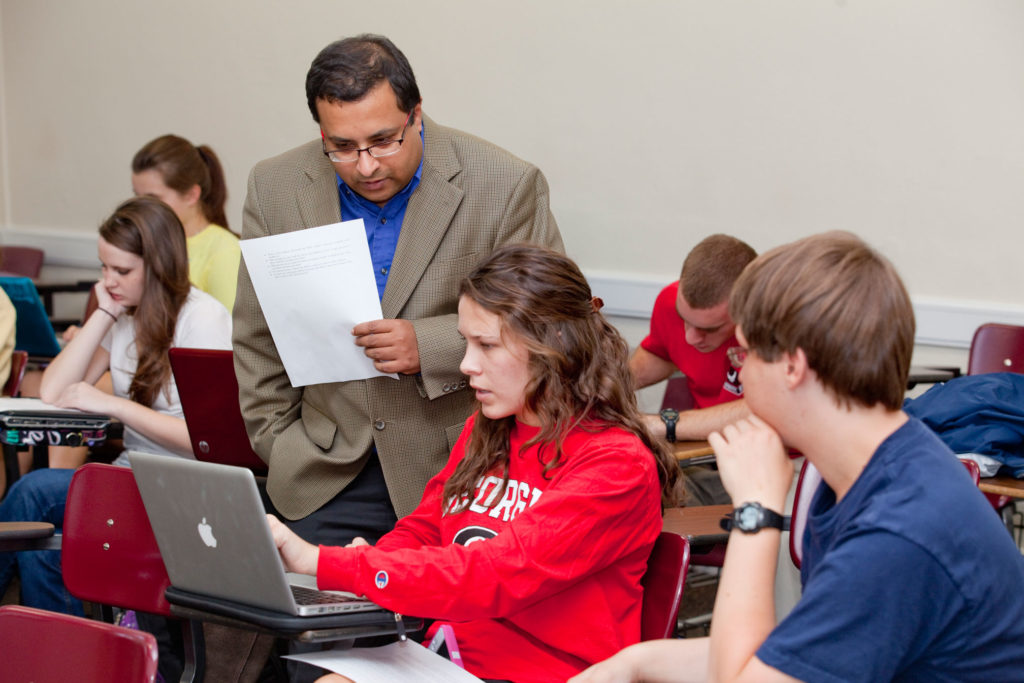Growing up in the pre-Internet era of Mumbai, India, Swarn Chatterjee recalls the sense of intrigue he had while watching his father fill out paper applications for mutual funds.
“He was an entrepreneur and a do-it-yourselfer,” Chatterjee said. “He used to manage his own money and business.”
The young Chatterjee often ended up poring over a fund’s prospectus and asking his father questions about finances.
Chatterjee, an associate professor in the College of Family and Consumer Sciences, points to those conversations with his father as the beginning of his interest in the world of financial services.
During his graduate studies in finance at Texas Tech University, Chatterjee discovered personal financial planning as an area of study. He went on to earn his doctorate in consumer economics with an emphasis in personal financial planning from Texas Tech.
“This field focused on researching individual financial decision-making, as opposed to corporate decision-making,” he said. “That appealed to me more. Household finance and behavioral economics were fields that were emerging. There was a gap in the literature in that area so I decided to go into this field.”
Chatterjee’s current research focuses on three areas: measuring the value of financial advice across the different stages of the financial planning process; examining factors that are associated with greater financial resiliency among households recovering from an adverse financial event; and determining the association between household financial decision-making and food insecurity as well as food purchase behavior.
Chatterjee also seeks to identify factors that improve financial decision-making among transitioning young adults, such as the college students he teaches, and the elderly.
“There seems to be some issues that are lingering that affect both. Financial literacy is one; cognitive mistakes individuals make is another,” Chatterjee said.
As it turns out, socialization to financial practices as a child, such as the education he received from his father as a boy in India, has been positively identified as a factor in a person’s financial well-being.
“We’re seeing vast disparities in financial literacy in those who are doing well financially and those who are not,” Chatterjee said.
In addition to his ongoing research efforts, Chatterjee teaches several classes related to financial planning, including behavioral economics, family portfolio management and computer applications, and serves as adviser to the FACS Student Financial Planning Association.
“I love to teach and I love to conduct research, but the most rewarding part to me is to be able to introduce students to the cutting-edge research that’s taking place and relate that to their classroom learning,” he said. “I think that adds value to what they take away from this class. They’re able to translate some of the research we’re doing into real-life practice as they graduate and become financial planners or researchers and scholars in the field.”
Chatterjee is part of a department that offers three majors: financial planning, consumer economics and housing.
The overlapping research interests and interdisciplinary nature of the department gives students unique insights into the field and adds to the great camaraderie among faculty members, he said.
“Swarn is a dedicated faculty member who always goes above and beyond for the department,” said Sheri Worthy, FHCE department head. “He is a great team player and everybody loves him-his students, his colleagues and his administrators. He excels in teaching, research and service, which is an excellent attribute for land-grant university faculty.”
The growth of the financial planning industry—statistics from the Bureau of Labor show the employment of personal financial advisers is projected to grow 27 percent from 2012-2022—makes the field of study an attractive one.
Chatterjee said this upward trend in employment prospects, combined with the practical training students receive in the major, make his work extremely gratifying.
“I think the ability to communicate good research and integrate that with teaching is very powerful,” he said. “I believe it increases the learning of students in that area. I think the students enjoy it, and I love it.”
